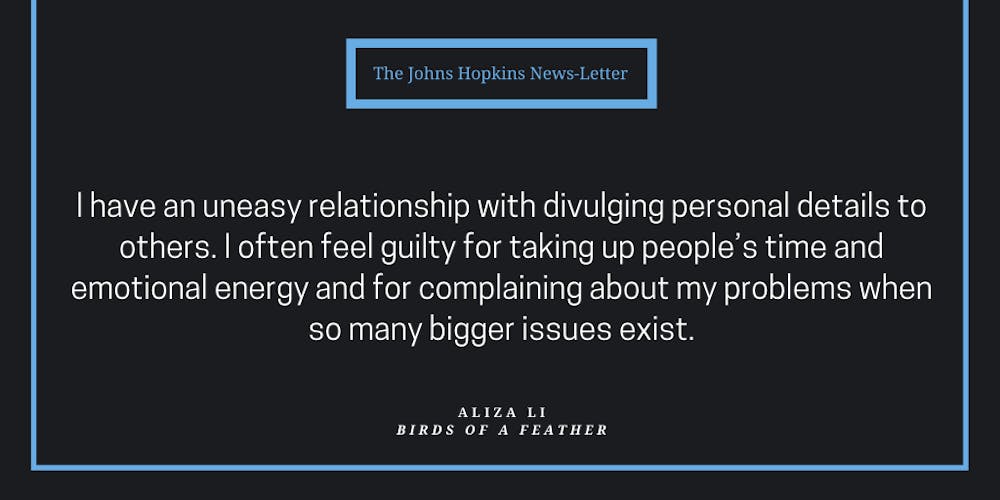
Over a plate of too-salty fried rice and oily bún bò huế, my friend watches me cry. We’re getting lunch at a little Vietnamese eatery after church on a particularly muggy day. The waiter comes by every once in a while, awkwardly refilling our glasses with lukewarm tap water and avoiding eye contact with me. The couple next to us is trying their best not to listen in.
My friend listens patiently as I struggle to speak through sniffles and wet coughs. She comforts me, answering each of my concerns with the soothing croon of advice and empathy. Still, like always, I find myself regretting what I shared that day.
I have an uneasy relationship with divulging personal details to others. I often feel guilty for taking up people’s time and emotional energy and for complaining about my problems when so many bigger issues exist. I choose to withhold information and to listen more than I share. In some ways, I enjoy the feeling of self-gratification that this position affords me. In my eyes, by giving more than I take, I think that I am being the most loving and selfless I can be.
The summer before sophomore year, I asked each of my friends to take a love languages quiz and share the results with me, collecting the data in a small spreadsheet. My hope was to understand the needs of my friends better and be more conscious of how I could support them. The exercise allowed me to acknowledge the fact that people seek and give love in different ways, which I didn’t fully understand until later in the semester when a friend of mine confronted me about something.
Confrontations with friends were still new to me at that point. I wasn’t used to working through things with other people and being honest with them about the ways they hurt me. Suddenly, I found myself on the receiving end of a confrontation of sorts, in which a friend of mine brought up an issue he noticed in our friendship that was hampering its growth.
As he spoke to me about my tendencies to avoid vulnerability and keep our interactions strictly surface-level, I realized my assumptions that people only enjoy sharing and not listening were projections of my own feelings. My own preferences for giving and receiving love cannot always be extended to other people. Other people not only appreciate hearing from others, but they also consider this vulnerability to be a sign of love. By withholding my own personal life from my friends, I fail to show real love to them.
Through the intimacy of a conversation — whether over a bowl of fried rice or across the five feet of carpet between two dorm beds — two people are able to participate in a moment of love, characterized by a mutual sense of trust as they share personal details about their life and daily struggles. Part of loving others is expecting that love to be reciprocated.
This can be a difficult expectation to have because it requires opening ourselves up to the possibility of disappointment and trusting other people with a piece of our heart. However, vulnerability is an act of love in and of itself. Until I learned to better trust people, it was hard for me to expect love from them. I didn’t feel like I had the space to share due to my self-imposed restrictions.
Now, many of my ideas about love are founded on this idea of unconditionality and trust, an idea that comes not only from my experiences with friends but also from my faith. In a moving hymn in Psalm 139, the Psalmist David writes, “If I take the wings of the morning and dwell in the uttermost parts of the sea, even there your hand shall lead me, and your right hand shall hold me.” The picture of love shown is infinite, all-encompassing and vulnerable — to love and be loved is to know and be known, to empathize and to expect empathy.
Aliza Li is a sophomore from Houston, Texas studying Writing Seminars and Cognitive Science. Her column explores how her relationships with others are continuously transforming her and her college experience.





